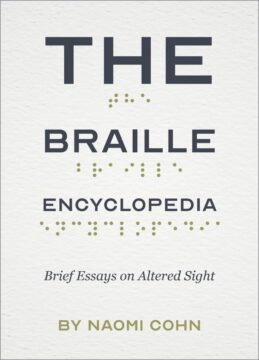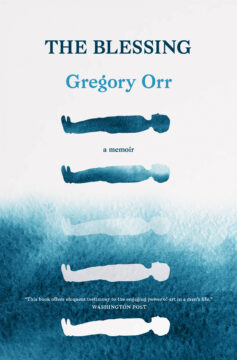by TJ Price
At a certain point, all memory is fiction. What we retain of the past is selective—our brain typically glosses over the finer details—even the substance of it is subject to change. Our past, much like our present and future, is fluid, constantly running, and not even Memory can step in that same river twice. The memoir, however, attempts to fix what is in flux, to render still the dynamic motions of the past. Often, I find that reading memoir comes with a sense of forced progression—a somber plod of narrative, marrying recollections of a life to the dramatic scaffolding of the Hero’s Journey—but lately, I have discovered a wholly new avenue of the telling, and in a surprising place: poetry.

I first heard of The Braille Encyclopedia: Brief Essays on Altered Sight, by Naomi Cohn (in a gorgeous paperback publication by Rose Metal Press) by way of a friend, currently researching altered sight for a thesis. Braille is, of course, the writing system of the blind, consisting of little raised dots in a matrix, each arrangement translating to a letter, or sometimes an entire word. What I didn’t know about it, however, as I learned from the excerpt that my friend posted, was that Louis Braille had been accidentally blinded at the tender age of three years old in his father’s workshop, with an awl. Cohn remarks on this, drawing a breathtaking association: “Is it an accident that my tool for making hand-punched braille is so much like an awl?”
It’s a curious book, not easily categorized. As the subtitle outlines, it is a collection of “brief essays,” arranged in the format of an imaginary encyclopedia, with each entry ranging from personal anecdote or recollection to etymology and jargon all the way to scientific fact and even Yiddish. These, more than anything, are poems—some of them are only a few lines, a paragraph—and each entry uses its title as a kind of homing beacon, returning back to it again and again to create a beautiful resonance underneath not only each “essay,” but layers of the same beneath the book in its entirety. The voice guiding the reader is frank, but also wry, and uniquely confessional. In so narrating the personal details and arranging them in this abecedarian manner, it overflows and touches far more stories than just its author’s own. The experiences belong to the writer, but the poetry used to convey them expands past this, and even beyond an inquiry of the visual sense itself, opening new avenues of thought via ontological questions of perceptions and perceiving, and even being perceived. Indeed, even the nature of reading (in all its many forms) is interrogated—how the endless permutations and combinatorics of language can transmogrify in the crucible of the mind.
It was good timing, too: I’d recently read Helen Keller’s The World I Live In, which also spoke at length about altered perception, and in quite a moving fashion, using evocative language to describe the theater of the mind. Keller’s book was obviously written much, much earlier than Cohn’s, and yet both channel a deep humanity—albeit in very different ways—yet both do it similarly: via poetry. It is in these very details which the authors choose to include—perhaps those which the sighted brain might overlook—where the beauty lies. How much of our modern English is sprinkled with idioms conflating visual language with understanding? We say “see?” when we are asking someone if they get it. We “focus” our attention. We even use our “imagination” (from “image,” defined as a visual representation of a real object) to dream—as Keller says, “Of us it is as true as it is of the seeing that the most beautiful world is always entered through the imagination.”
I would claim there is no better a portal to this place than poetry, which as a matter of course takes into account memory’s often shifting, ephemeral nature and elliptical cadences, rather than conforming to a rigid, Westernized ideal of linear narrative progression. Cohn comments on the genesis of the book in her Author’s Note, remarking that the abecedarian “encyclopedia” format transformed the content and forced her to re-evaluate certain aspects of her vision—both metaphorically and literally. She also comments that the pieces have been called various things over revisions, from “prose poems” to “flash memoirs.”
Memory and imagination are twins, in that they are both vulnerable to the distorting forces of great emotion, and there is no distortion greater than grief. When we grieve, memory can come in bright flashes, often intensified to a fever pitch, causing grimace or shudder at the recall. Our seeking selves scry omens from patterns found in nature: in the movement of the stars, the looping paths of birds in the sky, or the settling of leaves in the trees, to help us find our way back from a darkness absolute.
Gregory Orr’s devastating memoir The Blessing not only uses poetry in its telling, but as a narrative element itself, providing a path out of trauma and loss. After surviving a horrific accident in his childhood and enduring barbarism at the hands of authority later in his life, Orr comes to discover what he calls a “thread” of poetry.

“True to poetry’s laws of dream and metamorphosis, it changed in my hand as I held it. Sometimes, it was the thinnest silk filament, so fine it almost cut my palm simply resting there. Other times, it thickened and become slick as if with blood, all warm and wet, and it felt like my own throbbing guts paid out and now to be followed back toward what source or exit? Other times, it became braided and dry as a rope and I wondered if I were meant to twist it around my neck…”
Regardless, poetry provides the rope—the clew!—that leads Orr from this dark labyrinth of trauma and loss. I have friends who are brilliant, lyrical writers who insist to me they don’t “understand” poetry, and I cannot understand from where this feeling originates. Is it out of fear, that they’ll misinterpret the poem somehow, and be chastised for missing the point? Is it the ambiguity in poetry fosters which threatens, or is it discomfort with its scalpel-sharp point? Is it all that white space on the page, inviting (and challenging!) the reader to fill it with their own intellectual dignity? Perhaps it’s over-exposure to needlessly esoteric verse, consigned to endless pages of meter and rhyme—or, worse, the pablum glooped—seemingly from manufacturing tubes—and posted to places like Instagram?
Fashioning art from the wreckage of trauma is nothing new—the human mind must create something new in order to mourn—but Orr’s book examines the need for a language of being: not just used to describe the past, but for all points in our trajectory, even extending into the future, to assist in the process. “Here was meaning in the midst of time’s flowing,” Orr says toward the end of the memoir, and I think it speaks quite eloquently for not only his own book, but also Cohn’s, and Helen Keller’s too, “Here was the human spirit rising up, trying to transcend the limitations of our mortal, human bodies and at the same time celebrate them.”
Alice Notley said once that a poem is “never over when you finish reading it” and that is true in these books, as well. It has now been several months since I first read The Blessing, and I still find myself returning to the shelf to bring it over to the desk and quote it to a friend or colleague. The humanity bristling in this book positively startles—and this is true, too, for The Braille Encyclopedia. The poetry in both is quiet, ruminative; a constantly murmuring river of memory running alongside the turning pages, and when the light hits at just the right angle, it is impossibly beautiful.
Enjoying the content on 3QD? Help keep us going by donating now.
